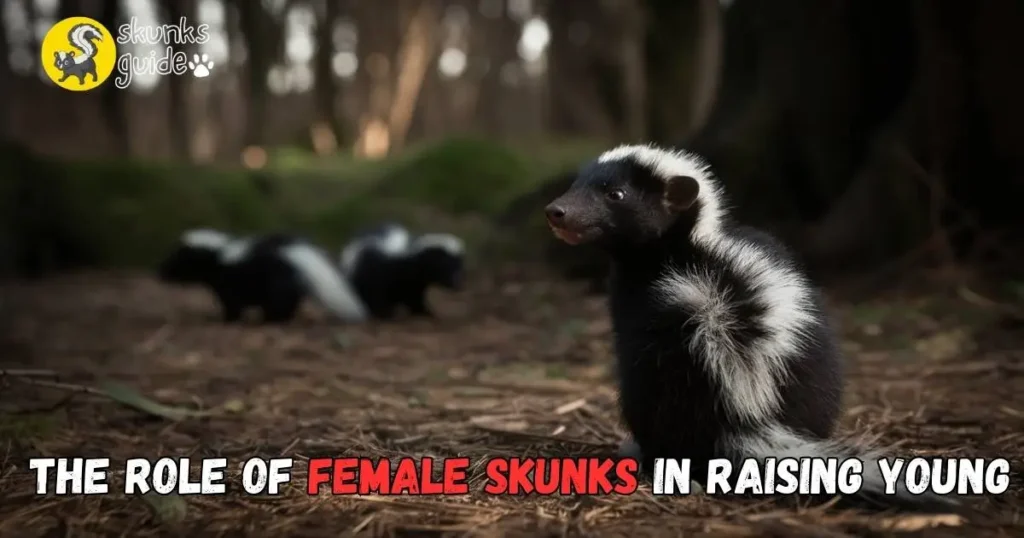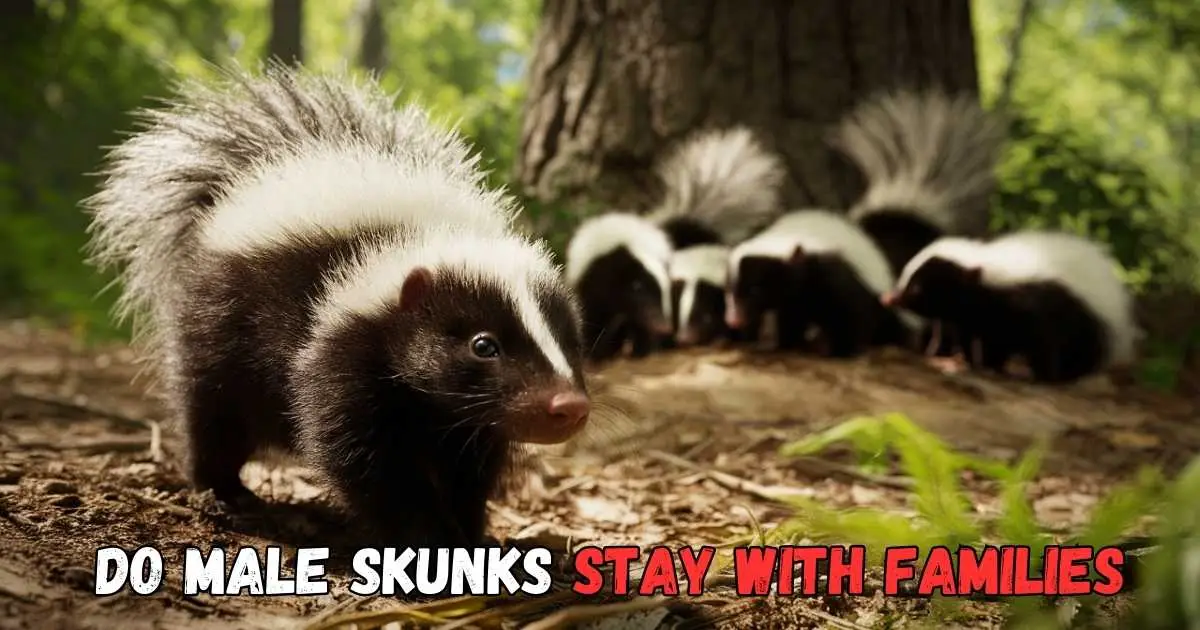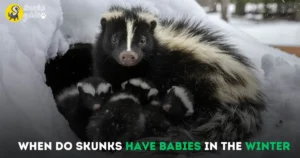Do Male Skunks Stay With Families?
No, they don’t! Male skunks set off on their own after growing up. From my experience studying skunk behavior, I’ve noticed how independent these animals become once they mature. Stick around, and I’ll share why male skunks leave and what they do in the wild that makes them so interesting!
Skunk Family Dynamics
Skunks are fascinating creatures with unique family structures. Understanding their social behavior helps us appreciate these animals. Do male skunks stay with their families? This question opens a window into their dynamics.
The Social Structure Of Skunks
Skunk families usually consist of a mother and her young. Male skunks have different roles compared to females. Here are key points about their social structure:
- Mother skunks raise their young alone.
- Male skunks may leave the family after mating.
- Young skunks stay with their mother for several months.
- Skunks are generally solitary animals.
In the wild, skunks prefer to maintain distance from each other. This behavior helps reduce competition for food and territory.
Common Misconceptions About Skunk Families
Many people hold incorrect beliefs about skunk family dynamics. Here are common misconceptions:
- Male skunks help raise the young. False.
- Skunk families stay together for life. False.
- All skunks are social animals. False.
- Mother skunks abandon their young. False.
Understanding these misconceptions is crucial. It helps people learn the truth about skunks.
Factors Influencing Skunk Family Dynamics
Skunk family dynamics are fascinating. Male skunks often leave their families. Understanding the reasons behind this can help us learn more about their behavior.

Seasonal Changes And Family Behavior
Seasonal changes play a significant role in skunk family dynamics. Here are some key points:
- Spring: Mating season begins. Male skunks seek mates.
- Summer: Families are more stable. Young skunks learn survival skills.
- Fall: Skunks prepare for winter. Some males leave to establish territories.
- Winter: Family units may hibernate. Males are usually absent.
| Season | Family Behavior |
|---|---|
| Spring | Males leave for mating. |
| Summer | Stable family units. |
| Fall | Males establish territories. |
| Winter | Familial hibernation. |
Impact Of Environment On Social Structure
The environment greatly affects skunk family dynamics. Here are some factors:
- Habitat: Availability of food sources influences family size.
- Predators: Presence of predators can lead to tighter family bonds.
- Human activity: Urban areas may disrupt skunk social structures.
- Food availability affects survival.
- Safe environments promote larger family units.
- Stressful environments may lead to increased male dispersion.
Understanding these dynamics helps us appreciate skunks better. Their behavior reflects their need for survival and adaptation.
Debunking Myths About Skunk Families
Many myths surround the social lives of skunks. Some people believe male skunks stay with their families. Understanding skunk behavior helps clarify these misconceptions.
Fact Vs. Fiction In Skunk Parenting
Skunk parenting differs from what many think. Here are some key facts:
- Male skunks do not stay with families. They leave after mating.
- Female skunks raise the young alone.
- Skunk families are typically small, usually with one mother and her kits.
- Skunk kits stay with their mother until they are about 10 weeks old.
These facts show that skunk family dynamics are unique. Male skunks play no role in raising the young.
Anthropomorphism And Misunderstanding Skunk Behavior
People often project human traits onto animals. This is called anthropomorphism. It leads to misunderstandings about skunks.
Common misconceptions include:
| Myth | Truth |
|---|---|
| Male skunks care for their kits. | Male skunks leave after mating. |
| Skunks live in large family groups. | Skunks usually live in small groups. |
| Skunks are social animals. | Skunks are mostly solitary. |
Understanding true skunk behavior helps dispel myths. This knowledge enriches our appreciation of these fascinating creatures.
The Role Of Female Skunks In Raising Young
Female skunks play a vital role in raising their young. They are nurturing and protective. Understanding their behaviors helps us appreciate these fascinating creatures.

Nurturing And Protective Instincts Of Mother Skunks
Mother skunks exhibit strong nurturing instincts. They fiercely protect their young from threats. Here are some key behaviors:
- Building a safe den for the family.
- Keeping the young warm and safe.
- Teaching essential survival skills.
Mother skunks remain attentive. They often stay close to their young. This helps create a secure environment.
How Female Skunks Provide For Their Offspring
Female skunks ensure their young receive proper nutrition. They hunt and gather food for the family. Here’s how they provide for their offspring:
- Foraging for insects, fruits, and small animals.
- Bringing food back to the den.
- Encouraging young skunks to explore and learn.
Mother skunks also teach their young about danger. They show them how to use their spray as a defense. This training is crucial for the young skunks’ survival.
| Behavior | Description |
|---|---|
| Building Dens | Creates a safe space for young skunks. |
| Foraging | Finds food to nourish the young. |
| Teaching | Shows young skunks how to survive. |
These behaviors highlight the dedication of female skunks. Their role is crucial for the survival and growth of their young.
Observing Skunk Behavior In The Wild
Understanding skunk behavior can be fascinating. Skunks are often misunderstood animals. Observing them in their natural habitat reveals their social dynamics. Do male skunks stay with their families? Let’s explore this question.
Research Methods And Findings
Researchers use various methods to study skunks. Here are some common techniques:
- Field observations
- Camera traps
- Tracking collars
Findings show that male skunks often leave their families. They typically disperse to find mates. However, some may stay with their mothers longer. This behavior varies by species and environment.
| Method | Description |
|---|---|
| Field Observations | Researchers watch skunks in their natural habitat. |
| Camera Traps | Automatic cameras capture skunks’ movements. |
| Tracking Collars | Collars help track skunk locations over time. |
How To Responsibly Observe Skunk Behavior
Observing skunks can be exciting. Here are some tips for responsible observation:
- Keep a safe distance.
- Use binoculars or a camera with zoom.
- Avoid loud noises.
- Do not feed them.
- Respect their space and habitat.
Be quiet and patient. Skunks may take time to appear. Remember, they are wild animals. Enjoy watching them without disturbing their natural behavior.
Understanding Skunk Family Bonds
Male skunks typically do not stay with their families. They often leave the nest shortly after birth to find their own territory. Understanding these dynamics helps us appreciate the social structure and survival strategies of skunk families.
Summarizing Skunk Family Dynamics
Skunks have unique family structures. They usually live in small groups. Female skunks raise the young. Males often stay away from the family.
Male skunks do not play a big role in parenting. They leave after mating. Female skunks take care of the kits. This includes feeding and teaching them.
Family bonds are important for survival. Young skunks learn from their mothers. They become independent around 8-10 weeks old.
- Skunk family groups consist of:
- Mother skunk
- Young kits
Why Male Skunks Don’t Stay with Families
To fully understand why male skunks leave after mating, it’s essential to examine the evolutionary reasons behind this behavior. In the wild, males of many species exhibit similar behavior, focusing on the survival of their genes by mating with as many females as possible.
The Role of Reproductive Strategy:
For male skunks, their primary role in reproduction ends after mating. They do not participate in the nurturing or protection of their offspring. This is known as a polygynous mating system, where males mate with multiple females during the breeding season. By not staying with one family, males maximize their reproductive success by potentially fathering offspring in multiple locations.
Territorial Behavior:
After mating, male skunks often leave in search of new territories. Securing an area rich in resources such as food and shelter increases their chances of surviving the winter and reproducing again in the next breeding season. This territorial behavior is particularly important because it reduces the risk of competition with other males, ensuring access to mates in the future.
Energetic Priorities:
From a biological standpoint, raising young is energetically costly, particularly for species like skunks where the male is not biologically equipped to nurse or care for the young. By leaving the female to care for the offspring, males conserve energy and direct their efforts towards self-preservation, ensuring they are in prime condition to reproduce again.
Frequently Asked Questions
Do Skunk Families Stay Together?
Skunk families typically stay together until the young reach maturity. Mothers care for their kits, teaching them essential survival skills. Once independent, young skunks usually leave to establish their own territories. Adult skunks are generally solitary and do not form permanent family groups.
Do Male And Female Skunks Stay Together?
Male and female skunks typically come together during the mating season. After mating, they often separate. Skunks are generally solitary animals and do not form long-term bonds. They prefer to live independently outside of the breeding period.
How Many Skunks Usually Live Together?
Skunks typically live in small family groups or alone. A family group usually consists of a mother and her young. Adult skunks are often solitary, especially outside of breeding season. They may share den sites but prefer their own space for foraging and resting.
Conclusion
Male skunks typically do not stay with their families. They tend to leave once they reach maturity. This behavior is common among many wildlife species. Understanding these patterns helps us appreciate skunk family dynamics. Observing skunks can reveal fascinating insights into their lives and interactions in the wild.







